What Should I Know About Laboratory Scale Reactors Before Choosing One?
Struggling to scale your chemical reactions from beakers to a more controlled setup? Finding the right equipment can be confusing. We understand these challenges well.
Laboratory scale reactors are essential tools for precise chemical synthesis, process development, and material research. They offer controlled environments for temperature, pressure, and mixing, allowing for reliable and repeatable experiments.
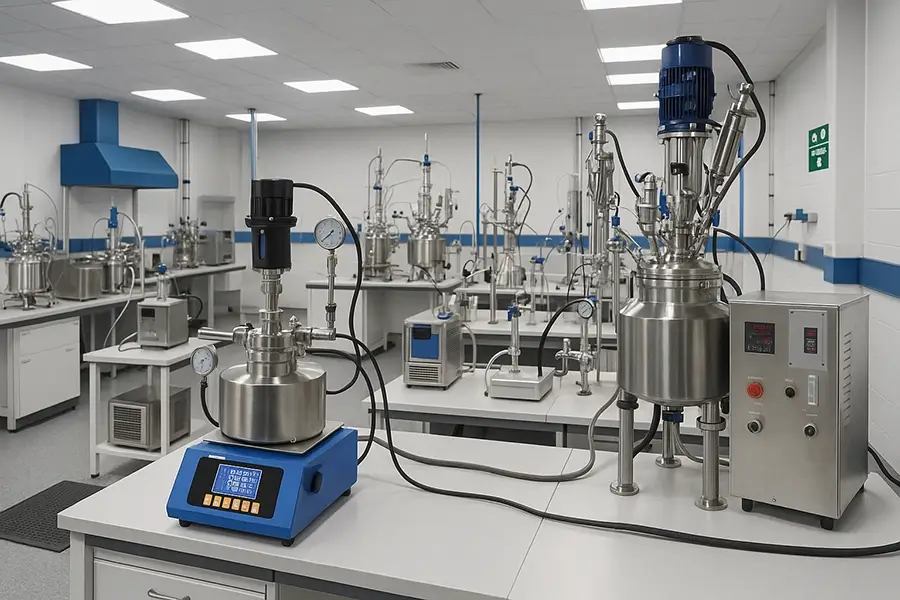
As a company with over 16 years of experience in manufacturing and exporting lab instruments, we've seen how crucial the right reactor is. Choosing the correct one impacts your research efficiency and success. Let's explore what makes these reactors tick and how you can pick the best one for your specific needs. We are here to help you navigate these choices.
What Exactly is a Laboratory Scale Reactor and What Can I Do With It?
Are you wondering if a beaker is enough, or if you need something more? Many researchers face this question when their experiments need better control and scalability.
A laboratory scale reactor is a vessel designed for small-scale chemical or biological reactions. It allows precise control over conditions like temperature, pressure, stirring speed, and reactant addition, making it ideal for research and development.

When I first started in this field, I often saw scientists trying to manage complex reactions in basic glassware. It was tough. A lab reactor is a big step up. It's not just a container; it's a controlled system. You can use it for a wide range of applications. For example, you might be synthesizing new chemical compounds, or maybe you're developing a new pharmaceutical drug. These reactors are also great for optimizing existing processes before you think about larger production. We've supplied units for everything from academic research in universities to pilot tests in biotech companies. You can perform tasks like polymerization, hydrogenation, crystallization, and many other chemical processes. The key is the control it gives you. This control ensures your results are consistent, which is vital for good science. Think of it as a mini version of a large industrial plant, right in your lab.
Common Applications:
Chemical Synthesis: Creating new molecules.
Process Development: Testing and optimizing reaction conditions.
Materials Science: Developing new polymers or nanoparticles.
Pharmaceutical Research: Small-scale production of active ingredients.
Bioprocessing: Small-scale fermentation or cell culture.
When Should I Choose a Glass Reactor for My Lab Work?
Do you need to see your reaction happening? Worried about metal contamination or harsh chemicals? These are common concerns when selecting reactor materials.
A glass reactor is ideal when visual observation of the reaction is critical, chemical inertness is required, or when working with corrosive materials that might react with metals. It's excellent for reactions at moderate temperatures and pressures.
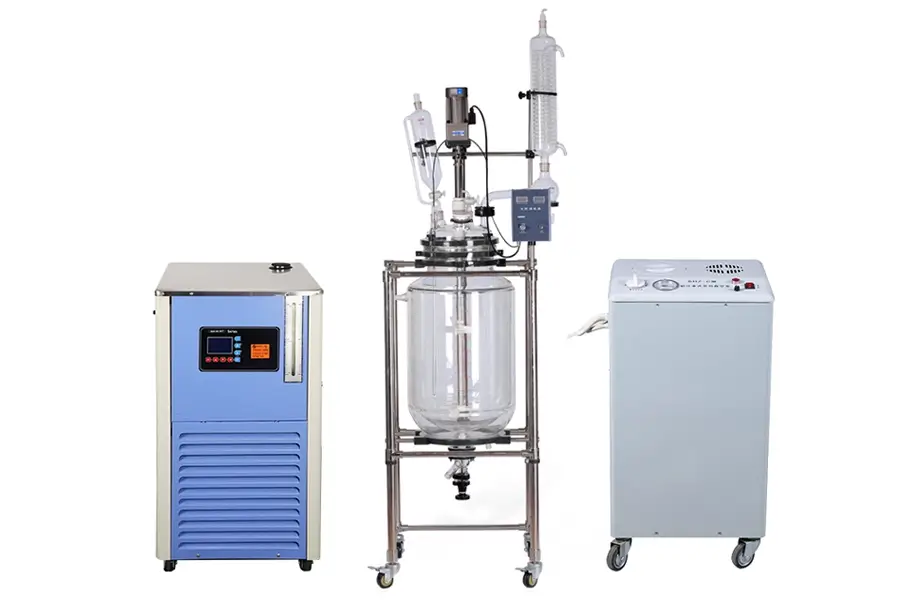
We've found that many of our customers, especially in academic research and pharmaceuticals, prefer glass reactors. The transparency is a huge plus. You can actually see what’s going on inside – color changes, phase separations, crystal formation. This visual feedback is invaluable. I remember a customer working on a sensitive crystallization process; being able to see the crystals form in their 10L glass reactor helped them fine-tune their cooling rate perfectly. Borosilicate glass, which we use, is also very resistant to most chemicals. This means you don't have to worry as much about the reactor material interfering with your reaction or corroding. Plus, they are easy to clean. Most glass reactors, like our jacketed models, allow for excellent temperature control by circulating fluid in the outer jacket. They are not for extremely high pressures or temperatures, but for a vast range of common laboratory reactions, they are a fantastic choice. We offer them in various sizes, from small benchtop units to larger pilot-scale models.
Advantages of Glass Reactors:
Full visibility of the reaction.
Excellent chemical resistance.
Non-contaminating.
Good for moderate temperature and pressure.
Easy to clean.
Considerations:
Limited pressure and temperature range compared to metal reactors.
Can be fragile if mishandled.
Are Stainless Steel Reactors the Tougher Choice for Demanding Processes?
Are your experiments pushing the limits of glass? Dealing with higher pressures or temperatures, or need something more robust for demanding applications?
Yes, a stainless steel reactor is generally tougher. It's chosen for its mechanical strength, ability to withstand higher pressures and temperatures, and good heat transfer capabilities, making it suitable for more demanding chemical processes.
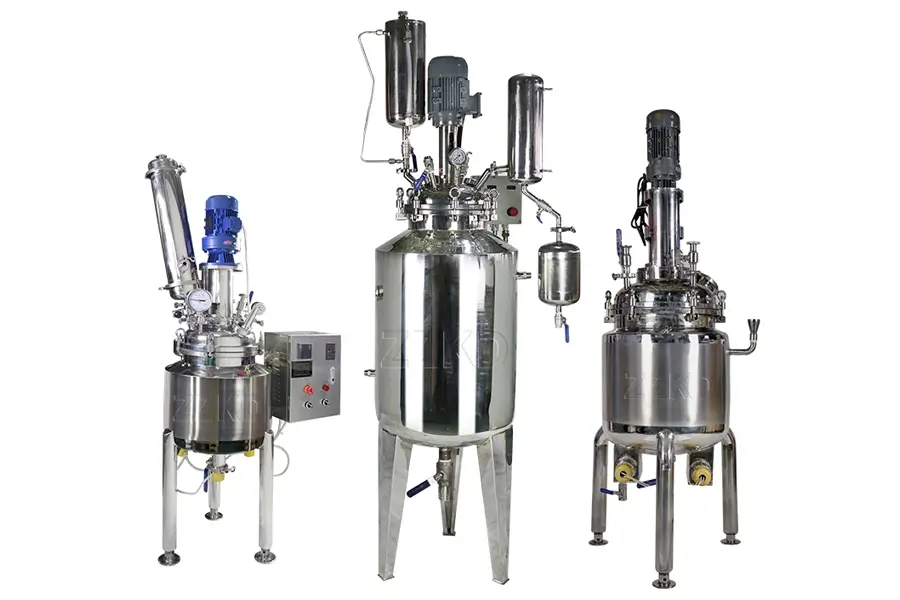
When durability and performance under stress are key, stainless steel is often the way to go. We manufacture these reactors for processes that glass simply can't handle. Think about reactions that generate significant pressure or require high temperatures for extended periods. Stainless steel, typically 304 or 316L grade, offers superior mechanical strength. This means it can safely contain reactions that might be hazardous in a glass vessel. I recall a client in the petrochemical industry who needed to run catalytic reactions at elevated temperatures; our stainless steel reactor was the perfect fit for their needs. These reactors also offer excellent heat transfer, which is crucial for maintaining precise temperature control, especially for exothermic or endothermic reactions. While you lose the visual observation aspect, the trade-off is increased safety and operational range. They are also very durable and can withstand more rigorous cleaning procedures. We often see them used in pilot plants and small-scale production where robustness is paramount. They are also excellent for applications like a crystallization reactor where precise temperature control and robust construction are beneficial.
Advantages of Stainless Steel Reactors:
High pressure and temperature capabilities.
Excellent mechanical strength and durability.
Good heat transfer.
Suitable for larger volumes and more vigorous conditions.
Considerations:
Opaque, so no direct visual observation.
Potential for metallic ion leaching with certain sensitive reactions (though 316L offers better resistance).
Under What Conditions Do I Need a High-Pressure Reactor?
Are your reactions stuck at atmospheric pressure? Some chemical transformations only happen under intense conditions, demanding specialized equipment for safety and success.
You need a high-pressure reactor when your chemical process requires pressures significantly above atmospheric levels to proceed efficiently or to achieve desired product yields, such as in hydrogenation, polymerization, or supercritical fluid applications.
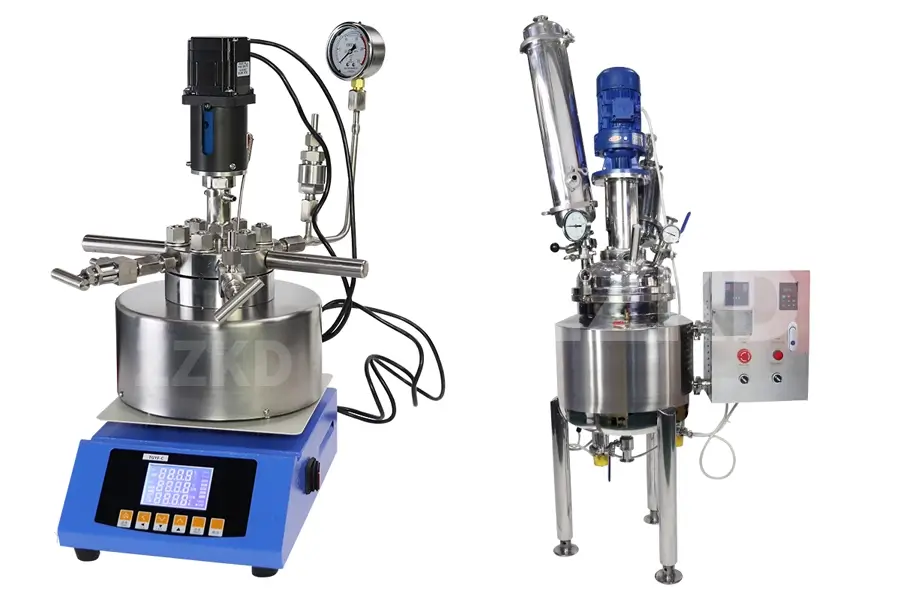
We get inquiries for high-pressure reactors from researchers working on some really cutting-edge stuff. These are not your everyday lab reactors. They are built to handle extreme conditions safely. If your work involves gases at high pressures, like hydrogen for hydrogenation reactions, or if you're exploring chemistry in supercritical fluids, then a high-pressure autoclave is essential. These reactors are typically made from robust stainless steel or other specialized alloys and feature sophisticated sealing mechanisms and safety features like rupture discs and pressure relief valves. I once helped a research team working on synthesizing novel catalysts; they needed to run reactions at over 100 bar. Our high-pressure system gave them the capability and peace of mind to do their work. These systems often come with advanced controls for monitoring and adjusting pressure, temperature, and stirring. Safety is the absolute top priority with these units, and we design them to meet stringent international standards. It's a specialized piece of equipment, but for certain research areas, it's indispensable.
Key Features of High-Pressure Reactors:
| Feature | Description | Benefit |
|---|---|---|
| Robust Construction | Usually made of stainless steel (e.g., SS316L) or Hastelloy. | Withstands high internal pressures and temperatures. |
| Sealing Mechanism | Specialized gaskets and closures (e.g., magnetic drive coupling for stirrer). | Ensures leak-tight operation under pressure, prevents sample contamination. |
| Safety Devices | Rupture disc, pressure relief valve, safety interlocks. | Protects personnel and equipment in case of overpressure. |
| Precise Control | Integrated temperature, pressure, and stirring controllers. | Allows for accurate and repeatable experimental conditions. |
Choosing a high-pressure reactor means carefully evaluating your process parameters and safety requirements. We always advise consulting with experts, like our team, to ensure you select the right system.
How Can I Ensure My Laboratory Reactor Serves Me Well for Years?
Worried about your investment not lasting? Proper care and maintenance are key to extending the life of any lab equipment, especially sophisticated reactors.
To ensure longevity, regularly inspect seals and gaskets, clean the reactor thoroughly after each use according to material compatibility, follow manufacturer guidelines for operation, and perform periodic preventive maintenance.
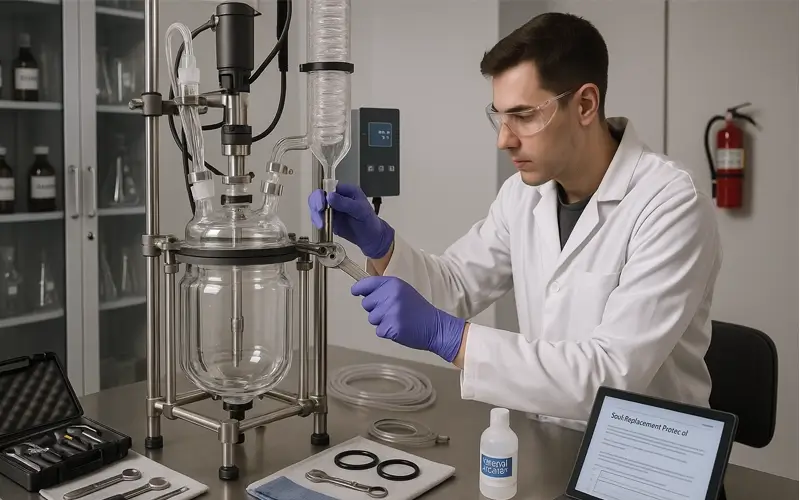
As a manufacturer, we want your equipment to last. It's not just about the initial purchase; it's about the long-term value. I always tell our customers that a little care goes a long way. For glass reactors, this means gentle handling to avoid chips or cracks, and thorough cleaning to prevent residue buildup, which can etch the glass over time or contaminate future reactions. For stainless steel and high-pressure reactors, checking seals, O-rings, and connections regularly is vital, especially if you're frequently changing conditions or working at high pressures. Always use appropriate cleaning agents for the reactor material – what’s good for glass might not be good for certain stainless steel grades or gaskets. We provide detailed manuals with all our equipment, and following those operating and maintenance procedures is the first step. Beyond that, setting up a simple maintenance schedule for tasks like checking stirrer motor function, calibrating sensors, and inspecting safety valves can prevent unexpected downtime. And of course, our 24/7 after-sales support team is always here to help with any questions or issues. Investing a small amount of time in maintenance pays off significantly in the lifespan and reliability of your reactor.
Basic Maintenance Checklist:
After Each Use: Clean thoroughly, inspect for damage.
Weekly/Monthly (depending on use): Check seals, gaskets, and connections. Lubricate moving parts if specified.
Annually: Consider professional inspection/calibration, especially for safety features on high-pressure systems.
Always: Follow manufacturer’s guidelines and use compatible chemicals for cleaning.
Conclusion
Choosing the right lab reactor involves understanding your specific needs regarding visibility, material compatibility, pressure, temperature, and scale. Proper maintenance then ensures its long performance.
